No, not THAT Melbourne, but the village of Melbourne in South Derbyshire, just 8 miles (13 km) down the road from me. In my previous blog post, I mentioned that I'd met my old pal, Doc Martin, when I visited Hicks Lodge. Martin had kindly told me of two locations that he recommended for bird photography, and one of them was Melbourne Pool. The weather was not too bad on this day, so, after lunch, I set off to check it out, not having visited this place for a few years.
Having parked by the church, I walked to the pool. There were plenty of birds on the water near to where I arrived at the pool, but I was looking straight into the sun so, having ascertained that there was nothing of particular interest in this area, I set off to visit the far side of the pool, taking a shot of a Black-headed Gull in winter plumage to check my camera settings.
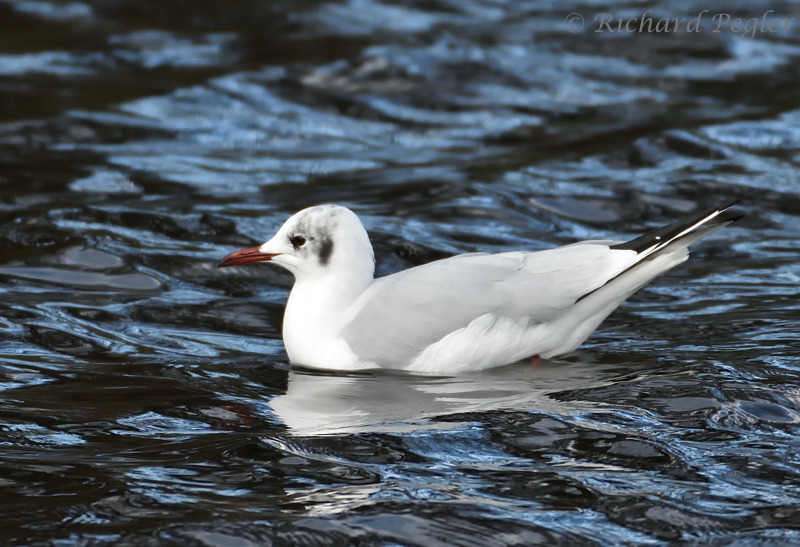 |
Black-headed Gull (Chroicocephalus ridibundus) - Melbourne Pool
|
As I approached the outlet weir at the south-east corner of the pool, I spotted a Grey Wagtail on the weir. My view of it was, unfortunately, strait into the sun and so I ducked away out of sight until I got to the other side of the weir - and found that it had gone!
As I had not passed beyond this point on my previous visits, I took the path along the south side of the lake and along to the western end but saw little as I did so, and so returned towards the weir immediately.
I'd just spotted what I thought were probably two of the Red-crested Pochard (RcP) that were the target for my visit, when a gentleman with a dog asked me if I 'knew my ducks'. I said I knew a bit and was here for the Red-crested Pochards. He told me that there were originally three - all drakes - but that one had been taken by a very large fish!
I did manage to get a distant shot of the two RcPs together and it was a little frustrating that they were relatively near to where I'd first accessed the pool side.
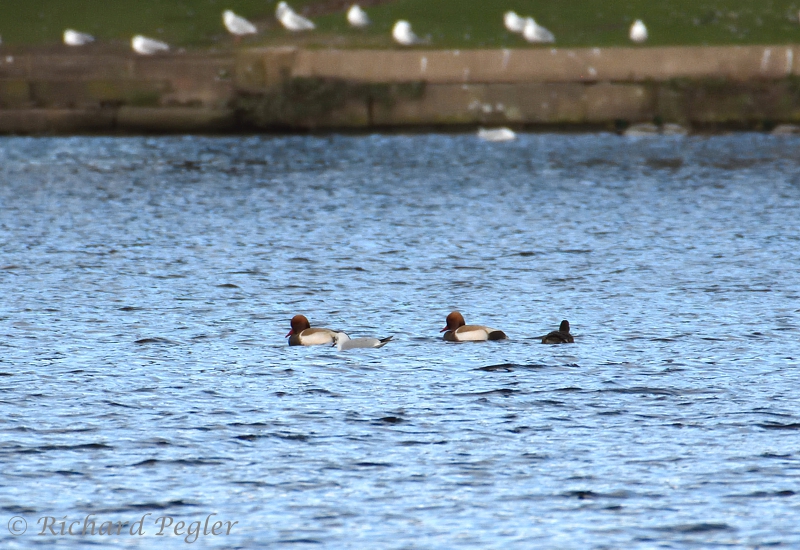 |
Red-crested Pochard (Netta rufina) (male) - Melbourne Pool
|
It was time to head back, taking a shot of the view across the pool as I did so.
 |
view across the pool to Melbourne
|
I cautiously approached the weir, but there was no sign of the wagtail.. Just beyond the weir, a Moorhen was making its way into the water.
 |
Moorhen (Gallinula chloropus) - Melbourne Pool
|
Arriving at the eastern side of the pool, I saw a lady who was feeding the gulls and ducks at the north-east corner. Feeding the ducks is one thing, but feeding gulls is definitely frowned on as it gets them into bad habits, such as stealing ice creams from children!
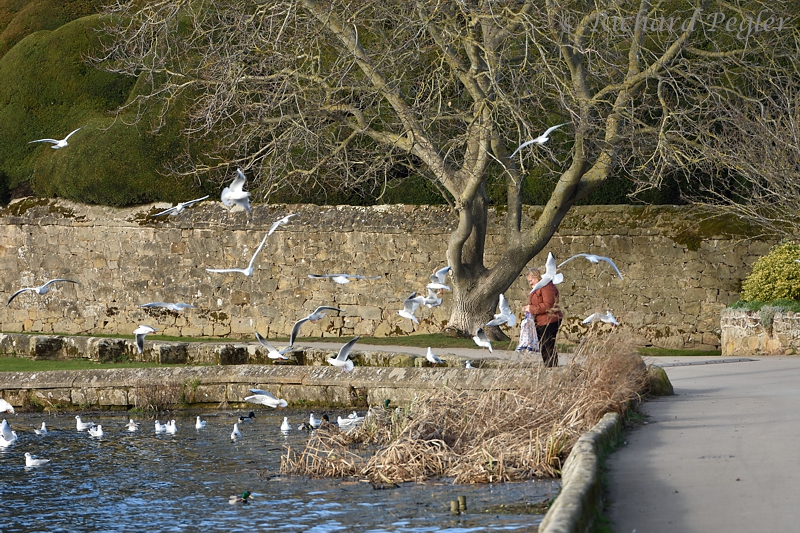 |
feeding frenzy
|
By the time I got there, the RcPs had already moved away and seemed to be heading towards where I had just come from, so I went back, and waited as the light would be from a much better direction. My wait was rewarded with it clouding over, a brief light fall of snow, followed by light rain, and the RcPs not arriving! Fortunately, the adverse weather didn't last long, and it did have the benefit of clearing the area of people. As I went to try and find the RcPs once more, I stopped briefly for a female Wigeon. This was the light and location that I'd hoped to get the RcPs in. However, I did not get the picture that I hoped for as I'd managed to leave my camera on settings for a totally different situation. The light and background seemed to be forever changing during this visit!
 |
Wigeon (Anas penelope) (female) - Melbourne Pool
|
Back on the road which runs along the east side of the pool, I found one of the RcPs at a useful distance, and in light that was occasionally helpful when the bird presented itself at the right angle. RcPs are vegetarian, and this one was diving for weed.
 |
| Red-crested Pochard (Netta rufina) (male) - Melbourne Pool |
Because of the changeable weather, the benches that are along this stretch were unoccupied and so I stayed for a while in relative comfort, getting more shots of the bird which seemed to have teamed up with a Coot. They were virtually inseperable, and were indulging in sychronised diving!
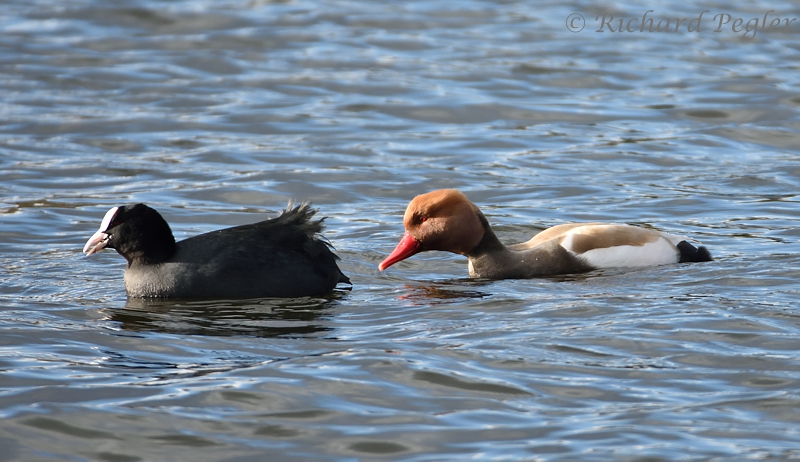 |
| Coot (Fulica atra) + Red-crested Pochard (Netta rufina) (male) - Melbourne Pool |
 |
| Red-crested Pochard (Netta rufina) (male) - Melbourne Pool |
The sun soon disappeared, but the RcP stayed relatively close. I was pleased to get some shots of it stretching its wings.
 |
| Red-crested Pochard (Netta rufina) (male) - Melbourne Pool |
I have said it before, and I'll say it again - I always manage to find myself surprised at how narrow the heads of some ducks are compared to their side-on profle. These next two shots seem to emphasize this.
 |
| Red-crested Pochard (Netta rufina) (male) - Melbourne Pool |
While this bird stayed relatively close, its congener was far away, close to the island in the middle of the pool. At one point, it started to have a wash. I have often seen ducks creating spray when they do this, and I like to try and capture the action. I have never, however, seen a duck create such a powerful spread of spray as this one did - I'm glad that I was not standing close!
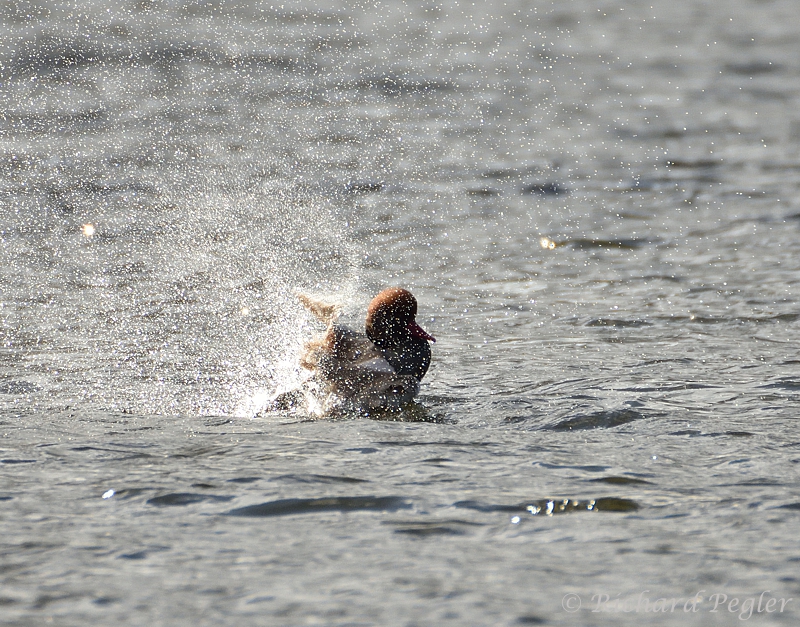 |
| Red-crested Pochard (Netta rufina) (male) - Melbourne Pool |
It was time to take a last look to see if the Grey Wagtail had returned. It hadn't, but by the weir a Coot seemed to be building a nesting platform.
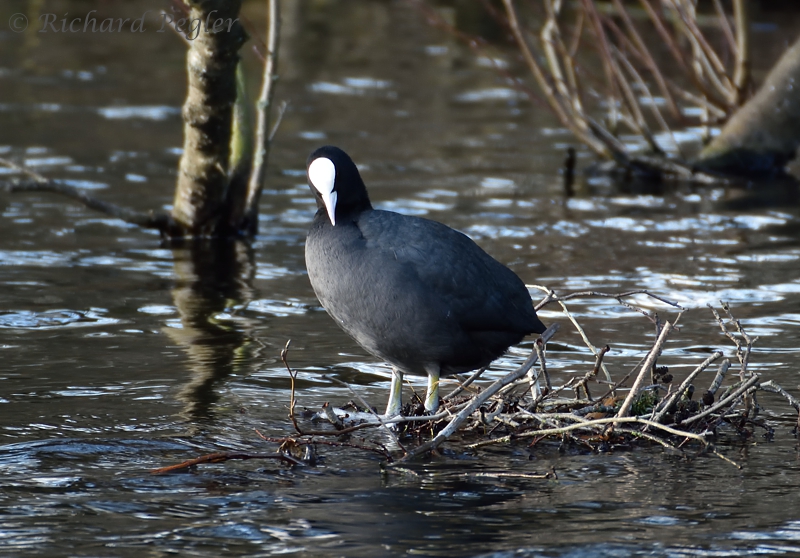 |
| Coot (Fulica atra) - Melbourne Pool |
It was time to head homeward. As I passed the massive hedge that forms a boundary of Melbourne Hall Gardens I could not help but wonder once more at the beauty of its shape, not fully captured in my photo.
 |
hedge - Melbourne Hall Gardens
|
Close to the exit of the area was a very strange-looking, but quite impressive, duck. I'm guessing that it was a hybrid between a Mallard and some sort of domesticated duck, rather than a species escaped from some exotic collection. It was significantly bigger than a Mallard, however. Your views will be welcomed.
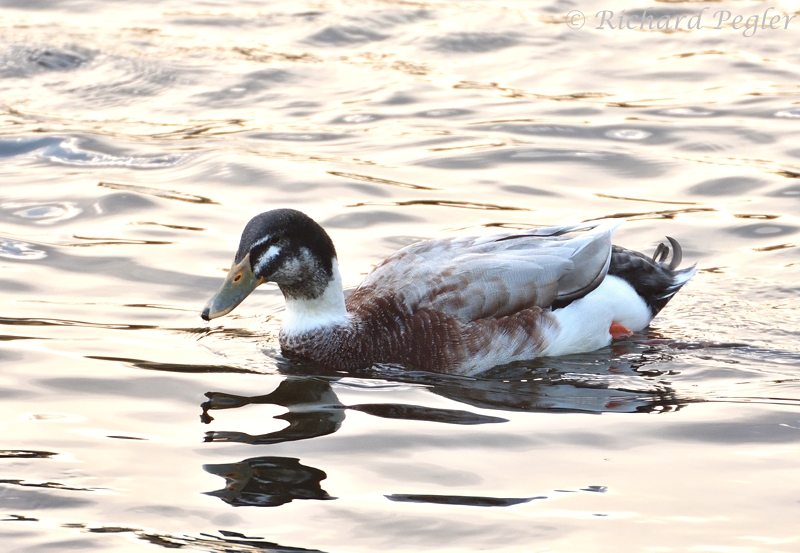 |
hybrid duck? - Melbourne Pool
|
Thank you, Martin, for pointing me in this direction. If the RcPs remain, I am hoping to return here on a day with more favourable weather and lighting. However, lookingg at the weather forecast, that may not be for some time as it appears we might be in for a string of storms with high winds for a while. On that note, I'll close this blog post.
My next blog post will probably be in about a week, and I have little idea of what the subject matter might be.
Thank you for dropping by. In the meantime, please stay safe, and look after yourself and Nature - - - Richard















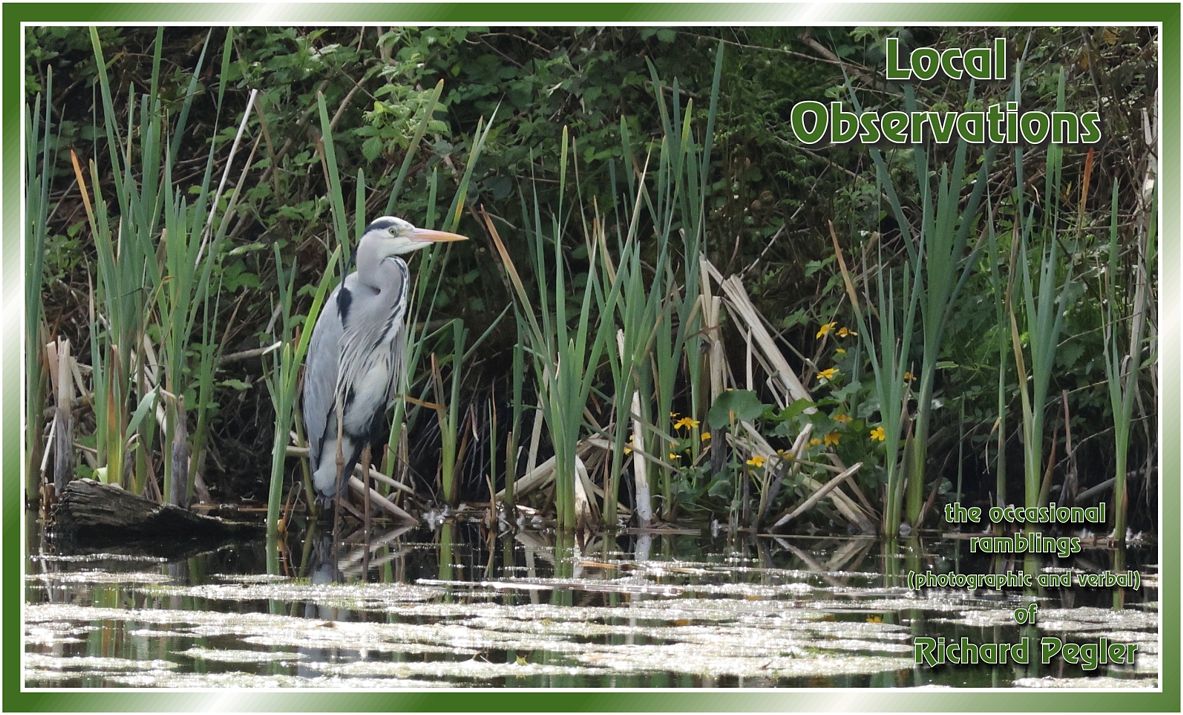
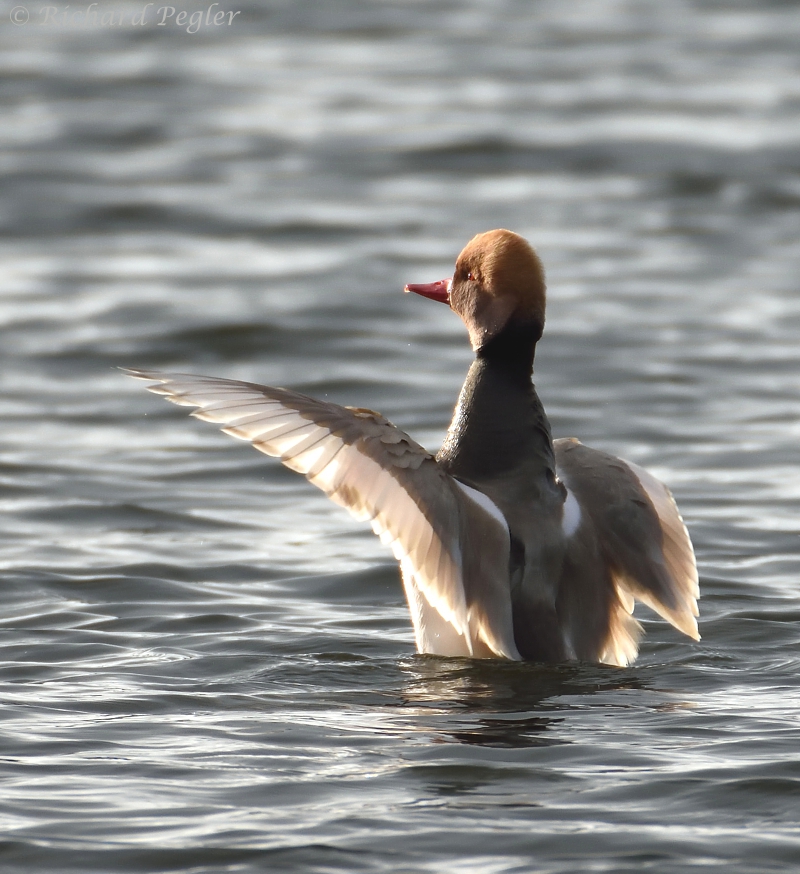

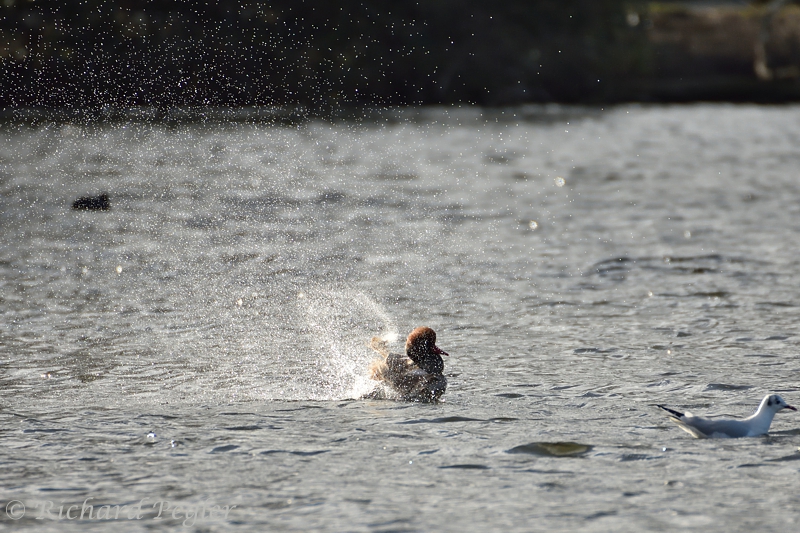
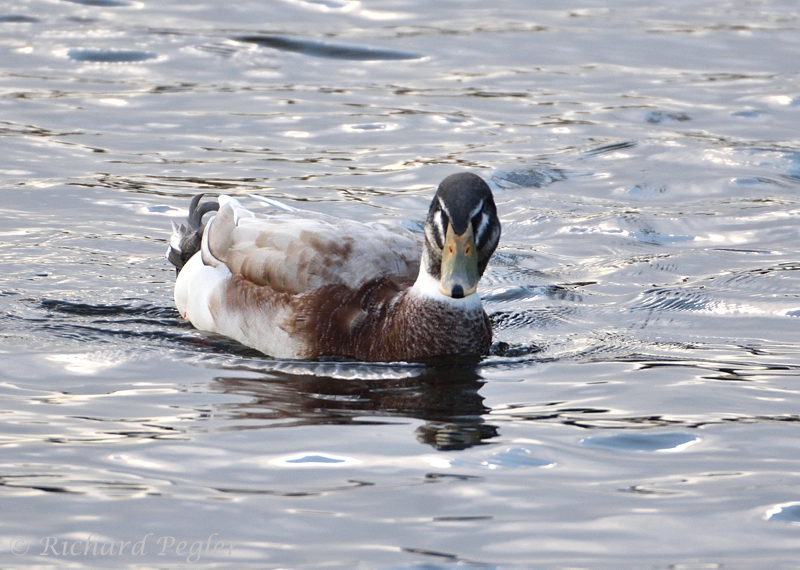
I must beg forgiveness about my ignorance re the geography of our land Richard. Having seen the mention of your visit to Melbourne (me thinks Australia), then you say its is in Derbyshire, a few miles from your home in Leicestershire. So here's me checking the map to discover N.Leic's borders S.Derby's....Learning something every day.
ReplyDeleteInteresting post, but sorry, don't know anything about hybrids Richard.
I'm not surprised to hear that you were unaware of the local Melbourne, Pete. It's just a (very pleasant) village and only just over the border from Leicestershire. We're right in the north-west corner of Leicestershire, and there used to be a pub named The Four Counties (now an Indian restaurant) just down the road from us in a hamlet named No Man's Heath, as it was almost on the border of Leicestershire, Warwickshire, Staffodshire and Derbyshire. This means that it is a bit restrictive for me to contemplate doing a 'County List' as much of my local time is spent in counties other than Leicestershire!
DeleteMy very best wishes -stay safe - - - Richard
Hi Richard
ReplyDeleteYou caught the Red-crested Pochard, fantastic. The love between Red-crested Pochard and a Coot????????????????
Thank you, Bob - now Coot and Red-crested Pochard would be an interesting hybrid!!!!!!
DeleteTake good care - - - Richard
Good morning Richard: Red-crested Pochard is a lovely duck. I last saw one in Slovenia, a lone male on a lake. I inquired whether it was an escape but was assured that it was of wild origin. It's great that you were able to get some decent pictures of it. That really is an odd looking Mallard hybrid, but Mallards seem prone to interbreeding with just about every other duck it seems, and some really interesting individuals are the result. Of course, they are fertile too and capable of breeding so the strangeness gets perpetuated and even exaggerated. Now a coot and a duck....that would be something to see! Best wishes to you and Lindsay. David
ReplyDeleteHello David. From what I have heard it seems that, although Red-crested Pochard are rather uncommon in UK, these males are annual visitors to this location. I've been told that they tend to wander off looking for mates as the season approaches, so I don't know whether they'll still be there next time I visit. I'm hoping to return soon but, in the current weather situation (almost continuous gales and rain), I have to think twice before even putting a foot outside the door, and it looks as if we have more than a few days of this yet to come.
DeleteMy best wishes to you and Miriam - - - Richard
Hi Richard! How special birds!
ReplyDeleteHello Anne. They are, indeed, very special birds!
DeleteHello Richard, :=) Many beautiful captures of the Red-crested Pochard, and the Moorhen is another super image. I'm sorry you were not able to see the Grey Wagtail, better luck next time.
ReplyDeleteJust as a matter of interest I have been helped to ID most of the moths by my blog friend Nick Morgan.
My best wishes.
Thank you, Sonjia. I hope to be trying for the Grey Wagtail again soon - as soon as this horrible weather (gale-force wind, and rain) passes.
DeleteI'm pleased to hear that Nick Morgan managed to identify those moths for you. Your possible Dock Moth looks a bit like a Blood Vein.
My very bast wishes - stay safe - - - Richard
We hope the stormy weather has cleared for you by now. Happy to hear you had an outing before the winds and rains descended.
ReplyDeleteWhat wonderful photographs of the Red-crested Pochard! A very handsome duck, indeed.
We are constantly amazed to see the varieties produced by Mr. Mallard and "whatever"! Even Gregor Mendel would be perplexed.
Our weather has turned very spring-like this week and we're hoping to get out often as migration is in full swing.
Gini and I hope all is well with you and Lindsay!
The one storm left us this morning, Wally, but the next one is due to arrive mid-day tomorrow, thankfully of significantly lower magnitude - he said with fingers crossed!
DeleteWe too are seeing some signs of spring, but I suspect that it will turn out to be a false start. Some of our avian winter visitors to the garden are still with us, and have successfully weathered the storms - but a juvenile Sparrowhawk has recently been making a nuisance of itself, and it appears that many birds have headed off to safer restaurants.
My very best wishes to you and Gini - - - Richard
Lovely post Richard. I am very interested on how they cut that hedge. They must use a helicopter to get to some of it. I love seeing your birds they are so different to ours. Take care,
ReplyDeleteMike.
That hedge is, I believe a Yew hedge, Mike. It has very dense foliage and I'd be surprised if it was ever cut. It is, I would guess, over 20 ft high and folds itself into wonderful soft shapes. I must try and get a better photo next time I visit.
DeleteBest wishes - stay safe - - - Richard
Beautiful photos of your visit to Melbourne. I like the Red-crested Pochard. Greetings Caroline
ReplyDeleteThank you, Caroline. It is a very handsome duck and one that I have only once before seen locally.
DeleteBest wishes - - - Richard
Hi Richard, second time lucky, I just wrote a comment and it vanished as I finished. I so enjoyed the post, and as I have never even heard of the Red-Crested Pochard it was doubly interesting. Love the photos of it in all the spray, well done on catching the action. I would be interested to know what fish swallows duck though!!
DeleteI hope that you have missed the storms and that you have not had too much damage. We only got the tail end with lots of rain, but thankfully very little wind.
Stay safe and keep well. Regards to you and all the family. Cheers Diane
Hi Diane - you've managed to 'reply' on a comment from Caroline ;-}
DeleteI'm guessing that it was a large Pike that took the Red-crested Pochard. They are relatively common, and ferocious freshwater predators. The largest one recorded in Britain weighed in at a massive 46lb 13oz (21.2kg) !!!!!
Thankfully, we've only suffered minor damage, to one corner of our roof. We're still having strong wind gusts, and so getting out with the camera has been difficult. It looks as if we might get a respite tomorrow, however - fingers are crossed.
My very best wishes to you and Nigel - stay safe - - - Richard
Hello Richard
ReplyDeleteI haven't noticed the narrow head of the ducks yet, I'll definitely remember what you wrote the next time I meet and pay special attention to it... great post
Greetings Frank
I think that the narrow head is probably more pronounced on some species of duck, Frank. I shall have to start taking notice of which species exhibit this and see it corresponds with their feeding habits, for example.
DeleteBest wishes - - - Richard
Hello Richard, some wonderful Ducks you show us here. Thank you. The man taking care of that hedge must enjoy a lot of free time to get the job done.
ReplyDeleteRegards,
Roos
I had assumed, Roos, that the hedge was growing naturally like that, but I'm beginning to have doubts now. If it has been trimmed like that, I have no idea how this might have been achieved as it is truly massive!
DeleteTake great care and stay safe - - - Richard
Al principio pensaba que habías viajado a Australia, pero viendo esa maravilla de paisajes que tenéis en UK me he dado cuenta rápido que no habías viajado tan lejos. Te tengo felicitar por las fotos y en especial por las del Netta rufina, son extraordinarias. Un fuerte abrazo desde el norte de España, todo lo mejor!!!
ReplyDelete¡Hola Germán! Esta fue solo la segunda vez en mi vida que tuve el privilegio de ver a Netta rufina, y la primera vez fue bastante cerca de mi casa también, tal vez a 40 km, y hace 12 años. Fue muy emocionante para mí ver a estos dos pájaros.
DeleteMis mejores deseos desde Inglaterra, donde parece que la primavera comenzará pronto. Mantente a salvo - - - Richard